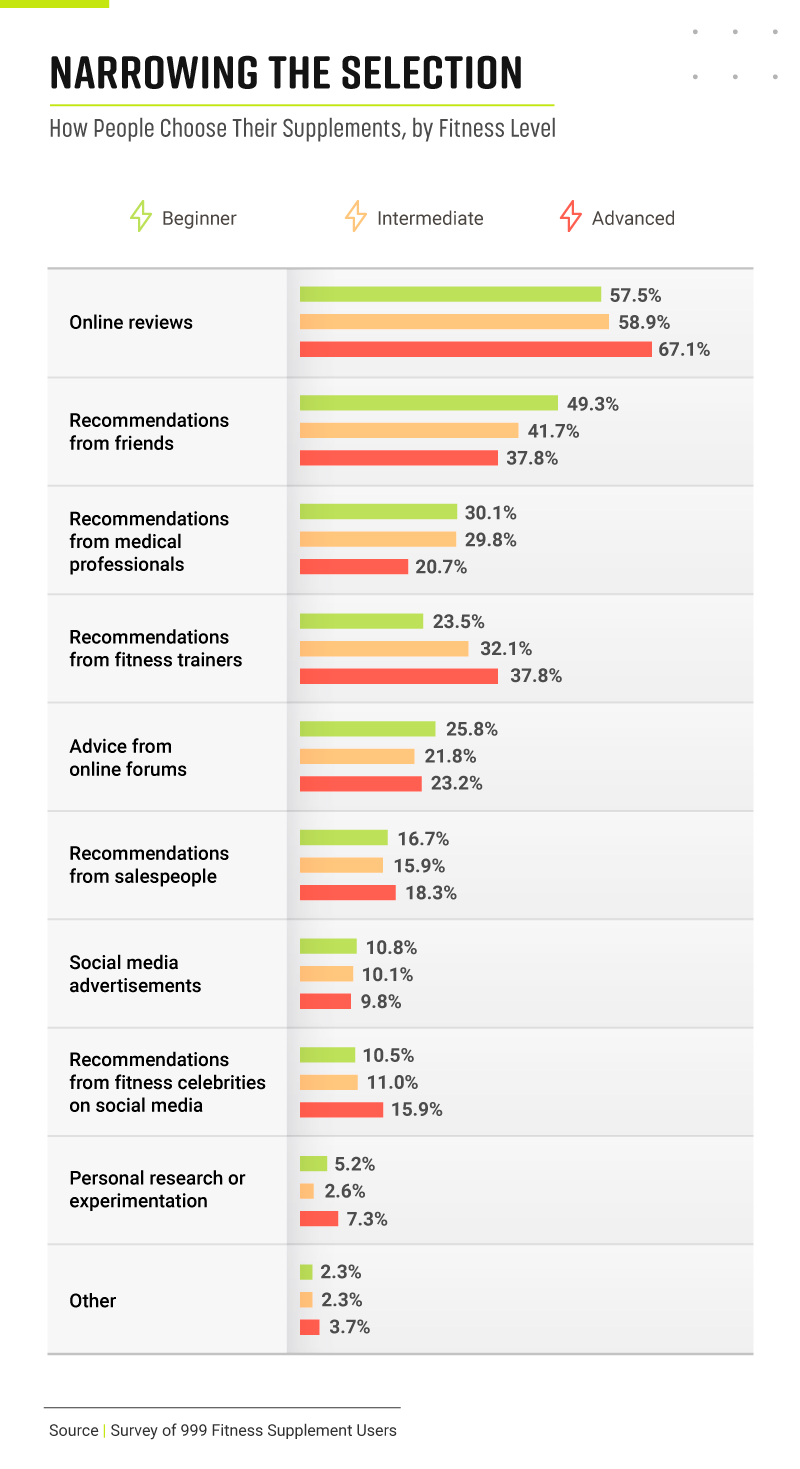Key takeaways
The fitness supplement industry is booming, with Americans enthusiastically consuming from over 90,000 products available, despite concerns over the effectiveness and safety of these products due to lack of strict regulation.
Whey protein and caffeine are considered essential by both men and women for achieving fitness goals, while preferences for other supplements like creatine and fat burners vary based on gender, fitness experience, and body type.
Supplements such as pre-workout and whey protein show high success rates among users, yet the effectiveness often depends on the individual’s fitness level and body type, with experienced athletes more likely to report benefits.
Side effects from supplements are common, with caffeine users reporting issues like headaches, shakiness, and insomnia – and whey protein users reporting gastrointestinal discomfort.
The business of vitamins and fitness supplements is booming. Recent research suggests that most Americans take at least one such product from the more than 90,000 options on the market. But within this massive industry—worth $37 billion by some estimates—consumer enthusiasm is dampened by uncertainty. In the absence of strict regulation, many manufacturers sell products with few real benefits. Worse still, dangerous outcomes are increasingly common. The American Association of Poison Control Centers reports a troubling rise in incidents resulting from supplement consumption.
Which vitamins and supplements are really worth taking, and which might not give you much support as you work toward your fitness goals?
Putting aside the sometimes bold claims found on supplement bottles, we set to survey 1,000 individuals about their real experiences with a range of products. Our findings reveal which products produce results for individuals at various fitness levels and with different body types. Additionally, we uncovered common supplement side effects, presenting a clearer picture of the potential trade-offs. Whether you’re beginning a new diet and fitness regimen or are looking for new products to support an established routine, you’ll be interested to learn what we discovered.
What supplements should I take for fitness?
Some fitness pros swear by complex combinations of vitamins and supplements (often called a “stack”), but beginners may feel most comfortable beginning with a single product. If you’re turning a new leaf in terms of diet and exercise—a New Year’s resolution, perhaps?—you’ll want to know which fitness supplements our respondents considered most essential (more later on what each supplement is used for).

Men and women were most likely to identify whey protein as an essential supplement, perhaps because it’s associated with broadly shared fitness goals, such as increasing strength and muscle size. Caffeine was also highly regarded by both genders. While many people consume it as a matter of habit each morning, the chemical found in coffee can improve workout performance as well.
Men and women differed in their views of other supplements, however. Men were far more likely to view creatine as essential, for example, whereas a greater percentage of women said sleep supplements and fat burners were fundamental to their routines.
Fitness experience also seemed to influence supplement preference. Respondents who identified as “advanced” fitness enthusiasts had a particular penchant for pre-workout in comparison to other fitness levels. It may be wise for fitness novices to steer clear. Experts say that pre-workout users can flood their systems with alarming amounts of sugar, caffeine, and other stimulants if they opt for the wrong product or dosage.
How effective are fitness supplements?
Of those who try each supplement, what percentage of individuals actually achieves the results they desire? Pre-workout and whey protein had the highest percentage of people reporting success, with approximately 6 in 10 users finding these supplements very or extremely effective. Respondents also reported high success rates with vegetable protein and branched-chain amino acids (BCAAs). If our findings suggest most people find these protein-centric products helpful, the same could not be said of supplements designed to eliminate fat. Just 41% of those who took fat burners found them very or extremely effective; experts say deceptive marketing is particularly rampant in this segment of the supplement industry.

Interestingly, respondents who regarded themselves as fitness beginners were less likely to find fitness supplements effective overall. Conversely, the advanced fitness cohort was most likely to find supplements effective. These findings likely relate to one of exercise’s painful ironies: Experienced athletes often enjoy visible gains more quickly than beginners. With a new weightlifting routine, for example, experts find that experienced lifters see muscle growth in three to four weeks, whereas novices typically won’t notice improvement for two months. Because our respondents quit using supplements after 4.5 weeks, on average, it’s no wonder beginners tend to find them less effective.
What are popular fitness supplements based on body type?
Diet and fitness goals differ enormously by body type, and respondents with various physiques found certain supplements effective for their own goals. Those who identified as ectomorphs or “somewhere in between” found protein varieties most effective, with more than 60% of respondents in these categories finding whey and vegetable proteins helpful. At the other end of the spectrum, pre-workout was the biggest hit for mesomorphs and endomorphs body types. Additionally, 62.5% of mesomorphs found creatine effective, a significantly higher success rate than other body types. Designed to support short bursts of speed or strength, creatine would logically appeal to those who already possess a healthy baseline of muscle.

Supplements didn’t always seem to work for those who needed them most, however. Endomorphs, who can struggle to lose weight, were the least likely to find fat burner supplements effective. This finding underscores the complex nature of achieving fitness goals: For many, diet, exercise, and supplements must work in concert to produce lasting change, and even then, progress can prove frustratingly slow. Indeed, almost 64% of respondents regarded diet and exercise as equally important for achieving fitness outcomes.
Side effects of supplements

Aside from the gains they sought from particular products, a quarter of respondents experienced another supplement outcome: side effects. Caffeine was the most likely to produce unwanted effects, which can include headaches, shakiness, and insomnia. A quarter of whey protein users also reported side effects; many who take it report gastrointestinal issues. Moderating how much one consumes may mitigate these symptoms. One survey respondent described indigestion after taking whey protein but attributed it to his inexperience gauging the right amount.
Pre-workout, which typically includes several sources of side effects, can also produce unpleasant symptoms. One respondent told us pre-workout made his heart “palpitate like crazy,” which could be attributed to the massive amounts of caffeine these products typically include. Fat burners also caused side effects for a large percentage of users—and some negative outcomes in this category surpass temporary discomfort. From elevated blood pressure to liver damage requiring hospitalization, the side effects of unregulated fat burners often cause lasting damage.
Where people are researching their supplements
With effectiveness of supplements uncertain and side effects are common, consumers have plenty of reasons to do their research before trying a new product. Advanced fitness types were the most likely to rely on online reviews to guide their supplement selection, but this was the most common source of information for all respondents. Experienced athletes also trusted tips from trainers and fitness celebrities, an ever-expanding presence on Instagram. Beginners, conversely, were the most apt to trust recommendations from friends and online forums.

Interestingly, only about 1 in 10 respondents at each fitness level said they were swayed by social media advertisements. Yet, ads for vitamins and supplements abound on Instagram and other platforms, both through paid posts and less conspicuous plugs by influencers—many making unfounded claims. Just 30% of beginners and intermediate exercisers consulted medical professionals, and advanced athletes were even less likely to do so. Experts say visiting a doctor before starting a supplement is essential for those with chronic illnesses because new products may exacerbate their conditions or interact with their current medications.
RELATED: Can working out help an underactive thyroid?
So you’re ready to start a supplement?
While our findings suggest that many people benefit significantly from consuming supplements, there are plenty of reasons to be cautious when considering new products. From unfortunate side effects to no effects whatsoever, disappointing outcomes are exceedingly common. Perhaps these findings reinforce the oldest premise of diet and exercise: There is no single, swift solution. Rather, success depends on realistic goals and incremental improvement in several areas. Supplements may help you achieve your health and fitness ambitions, but they’re unlikely to do so alone. If you’re thinking about starting a supplement regimen, first contact your doctor and see if there are any interactions with your current medications.
About the survey
Methodology
For this study, we surveyed 999 fitness supplement users who exercised at least once a week. 49.1% were men, and 50.9% were women. Less than 1% were nonbinary. 8.2% considered themselves to be at an advanced fitness level, 61.2% were intermediate, and 30.6% reported that they were at a beginner fitness level. 25.3% described their body type as endomorphic, 16.5% were ectomorphic, and 23.1% were mesomorphic. About 35% said they were a mixture of one or more types. On average, participants were 35.1 years of age with a standard deviation of 10.9. Their ages ranged from 18 to 74.
Limitations
Data and findings were not statistically tested nor weighted. Our analysis was by no means exhaustive of all possible fitness-related supplements. The supplements included in this analysis were chosen based on research and crowdsourcing a list of the most popular supplements. Only supplements with a sample size of at least 26 were included in our visualizations. If we had included more or different supplements, our findings may have varied greatly. There are also inherent weaknesses in using self-reported data, such as poor recall or incorrect memory, over-exaggeration, selective reporting, and underrepresentation.
Sources
https://www.livestrong.com/article/389807-what-does-stack-mean-in-bodybuilding/
https://jamanetwork.com/journals/jama/article-abstract/2672264
https://www.businessinsider.com/supplements-vitamins-bad-or-good-health-2017-8
https://link.springer.com/article/10.1007/s13181-017-0623-7
https://www.ncbi.nlm.nih.gov/pmc/articles/PMC5839013/
https://academic.oup.com/ajhp/article-abstract/70/7/577/5112467?redirectedFrom=fulltext
https://www.fda.gov/food/dietary-supplements
https://health.usnews.com/wellness/fitness/articles/2018-02-16/how-long-does-it-take-to-build-muscle
https://www.mayoclinic.org/drugs-supplements-creatine/art-20347591
https://www.britannica.com/science/endomorph
https://medlineplus.gov/caffeine.html
https://www.mayoclinic.org/drugs-supplements-whey-protein/art-20363344
https://www.fda.gov/consumers/consumer-updates/fda-101-dietary-supplements
https://www.nejm.org/doi/full/10.1056/NEJMp1315559
https://www.vox.com/2018/4/9/17199164/beauty-vitamin-collagen-turmeric-biotin
https://www.fda.gov/food/dietarysupplements/usingdietarysupplements/ucm110567.htm




